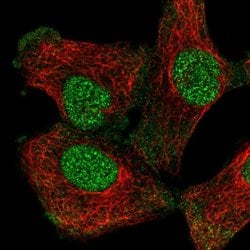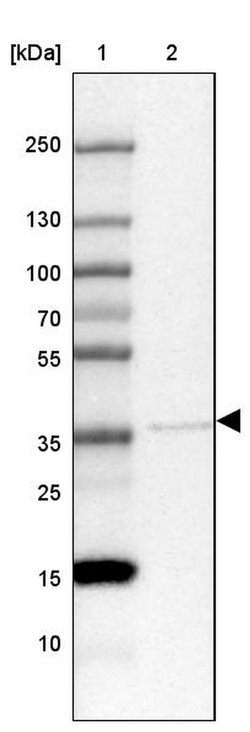Promotional price valid on web orders only. Your contract pricing may differ. Interested in signing up for a dedicated account number?
Learn More
Learn More
MAF1 Rabbit anti-Human, Polyclonal, Invitrogen™
Rabbit Polyclonal Antibody
Supplier: Thermo Scientific PA563585
Description
Immunogen sequence: FLVPVKGHAG KCRWKQCLCE KCYLISERQK IMAAQKVLKT QAAEEEQEAA LC Highest antigen sequence identity to the following orthologs: Mouse - 75%, Rat - 73%.
This gene encodes a protein that is similar to Maf1, a Saccharomyces cerevisiae protein highly conserved in eukaryotic cells. Yeast Maf1 is a negative effector of RNA polymerase III (Pol III). It responds to changes in the cellular environment and represses pol III transcription. Biochemical studies identified the initiation factor TFIIIB as a target for Maf1-dependent repression.
Specifications
| MAF1 | |
| Polyclonal | |
| Unconjugated | |
| MAF1 | |
| homolog of yeast MAF1, repressor of RNA polymerase III transcription MAF1 homolog | |
| Rabbit | |
| Antigen affinity chromatography | |
| RUO | |
| 84232 | |
| Store at 4°C short term. For long term storage, store at -20°C, avoiding freeze/thaw cycles. | |
| Liquid |
| Immunocytochemistry, Immunofluorescence, Immunohistochemistry, Western Blot | |
| 0.1 mg/mL | |
| PBS with 40% glycerol and 0.02% sodium azide; pH 7.2 | |
| Q9H063 | |
| MAF1 | |
| Recombit protein corresponding to Human MAF1 | |
| 100 μL | |
| Primary | |
| Human | |
| Antibody | |
| IgG |
Product Content Correction
Your input is important to us. Please complete this form to provide feedback related to the content on this product.
Product Title
Research Use Only
Spot an opportunity for improvement?Share a Content Correction


